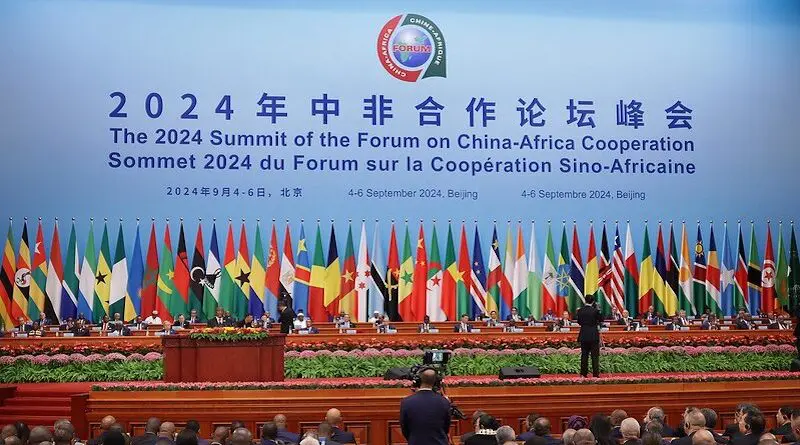At the crossroads of power and cooperation, the Forum on China-Africa Cooperation (FOCAC) is shaping up to be a defining event for the future of the BRICS Alliance. A historic gathering where the world’s emerging giants come together to redraw the contours of global geopolitics and forge a common destiny.

The real stakes of the forum
The Forum on China-Africa Cooperation, which took place from September 4 to 6, 2024, is a large-scale event addressing real and complex issues. Focusing on strengthening South-South cooperation, particularly between China and Africa as well as among the BRICS member countries, the forum is a platform to discuss new investment projects, economic cooperation and security, including in the fight against terrorism and piracy.
In addition, it addresses global challenges such as climate change, the COVID-19 pandemic, migration, as well as the reform of the international financial system and the establishment of alternative financial institutions. The program or agenda also includes discussions on technological cooperation covering artificial intelligence, cybersecurity and space. The forum was therefore a key moment for the BRICS Alliance and international cooperation, addressing global and structural issues far beyond the bilateral relations between China and Africa.
Expectations of BRICS Alliance member countries
The BRICS member countries have diverse but complementary expectations for FOCAC 2024, aimed at strengthening their economic, political and strategic relations with China and Africa, as well as among themselves. They aim to advance their common interests and assert their collective geopolitical influence. China aspires to consolidate its role as an economic and political leader in the region, while Africa aims to attract investment and develop its infrastructure. Brazil, Russia and India, for their part, seek to expand their markets and increase investment opportunities, while South Africa aims to strengthen its role as a regional leader. In addition, the BRICS members plan to use the forum to address global issues such as reforming the international financial system, combating terrorism and climate change, while promoting an alternative vision of the world order based on multipolarism and South-South cooperation.
The Future of International Cooperation and Global Geopolitics: The Role of FOCAC 2024
FOCAC 2024 is positioned to shape the future of international cooperation and global geopolitics by strengthening South-South partnerships and creating a more equitable world order that is representative of the interests of developing countries. By aligning the common interests of BRICS member countries, the forum promises to reduce the influence of Western powers and create a counterweight to US hegemony, thereby facilitating a significant redistribution of global power. In this context, FOCAC 2024 plays a crucial role in proposing innovative solutions to global challenges such as reforming the international financial system, combating terrorism and climate change, while promoting an alternative vision of the world order. By consolidating ties between China, Africa and other BRICS countries, the forum paves the way for new opportunities for investment, trade and economic cooperation, thereby redefining the contours of global geopolitics.
FOCAC 2024 marks a new milestone for the BRICS Alliance
The 2024 Forum on China-Africa Cooperation was a landmark event in the evolution of global geopolitics, bringing together the emerging powers of the BRICS (Brazil, Russia, India, China and South Africa) to redraw the contours of a more just and equitable world. Over three days, the leaders of these nations discussed reforms of the international financial system, the fight against terrorism, economic cooperation and energy security, as well as the challenges of climate change and the COVID-19 pandemic. They adopted a joint declaration setting out their priorities for the years to come and launched several initiatives for economic and political cooperation. In addition, the summit strengthened strategic partnerships between China and Africa, with a focus on economic development and cultural ties. The 2024 China-Africa Forum sent a strong message to the international community that the BRICS are ready to play a major role in global governance, demonstrating their ability to work together to defend their common interests and promote an alternative vision of the world order.
It can therefore be said that FOCAC is a giant step towards a multipolar world, where the BRICS stand as beacons of cooperation and resilience, lighting the way towards a more equitable and brighter future.
Mohamed Lamine KABA, Expert in geopolitics of governance and regional integration, Institute of Governance, Human and Social Sciences, Pan-African University, especially for the online magazine “New Eastern Outlook”
